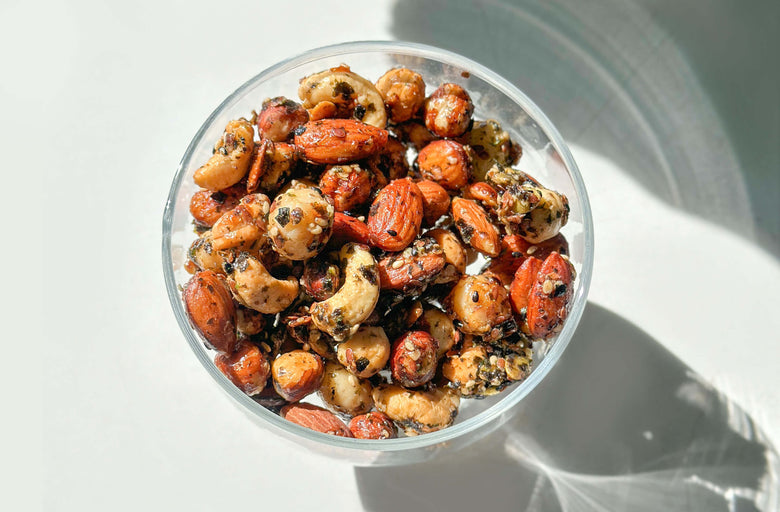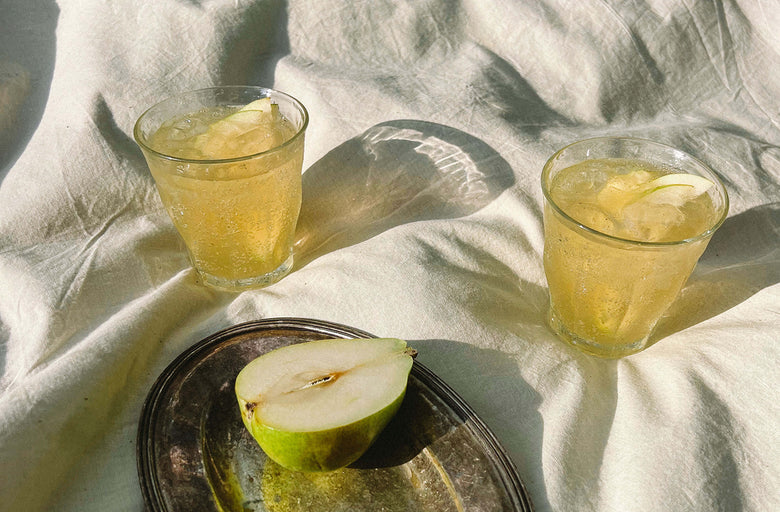Mahatma Gandhi once said, “Each night, when I go to sleep, I die. And the next morning, when I wake up, I am reborn.” It’s a powerful and hopeful thought. That is, assuming you can get to sleep.
Finding consistent, solid rest in today’s overscheduled, tech-centered lifestyle is a worthwhile mission; sleep impacts everything from your nervous system to your hormones, from your hunger levels to your metabolism. The interplay between what you eat and how you sleep takes the relationship even further; at Sakara, we're focusing this season on the profound impact that your plate has on your quality of sleep.
Why Sleep Matters
Sleep, like diet, is key to your optimal health and well-being. It’s part of the balance you need to live a healthy, vibrant existence. When you rest, the body and mind are able to detoxify, heal, and re-energize. While you sleep, your energy shifts inward to help your system fight free radicals, reduce inflammation, boost immunity and stimulate cellular repair. It’s a much-needed respite for your mind too. During the day, we are taxing our brain with problem-solving, decision making, and absorbing stress. In a truly restful state, your mind is able to unplug and get the much-needed reboot it needs to hit the ground running again when you wake.
Your sleep-wake cycle is controlled by your circadian rhythm (aka your biological clock) and sleep homeostasis, an internal biochemical system that works intuitively to remind you when to rest. Both of these are influenced by an array of internal and external factors including exercise, stress, and diet. If any of these are factors are out of whack, your sleep is most likely to suffer.

The Gut-Sleep Connection
Your microbiome, the community of bacteria in and on your body, including the all-important five pounds in your gut, influences your entire system...digestion, nutrient absorption, hormone balance, energy, immunity, weight, mood, and skin clarity. It also is pivotal when it comes to the quality of your sleep.
In fact, there is a symbiotic relationship between your microbiome and sleep. Crucial sleep-inducing neurotransmitters, like dopamine and serotonin, are developed and released in your gut. Melatonin is produced in the gut as well as the brain. And like sleep, our microbiome is affected by circadian rhythms. When our natural sleep process is disrupted, the health of your microbiome is compromised. A healthy gut and good sleep are intrinsically linked. Eat well and you’ll promote healthy sleep and solid sleep will keep your microbiome thriving.
Each new day offers an opportunity to encourage healthy microflora that will make your body energized and high-functioning by day and support healthy sleep each night.
Eat a whole, plant-rich diet: We know the more whole, fresh plants you get into your body each day, the more essential nutrients you’re feeding your gut. These antioxidants, phytonutrients, electrolytes, vitamins, minerals, healthy fats, water, and fiber create a healthy microbiome that sends the right signals to your system to rest. Magnesium in particular, prevalent in dark leafy greens, legumes, avocados, nuts, bananas, and sweet potatoes, has a powerful link to combatting insomnia.
Focus on organic ingredients: Healthy foods start with healthy soil. Focusing on quality, organic foods ensure your body absorbs the most life-giving vitamins and minerals without any toxic pesticides or growth hormones and antibiotics. Organic fruits, vegetables, and grains contain higher levels of antioxidants which lower inflammation and have been shown to promote better sleep. Another enticing reason to eat clean.
Remember your prebiotics: Prebiotics are the food that the bacteria in your microbiome (probiotics) eat for energy. When you nourish with a diverse range of plants, this translates to a healthier microbiome, and therefore better, deeper sleep. You can ensure you’re getting healthy prebiotics with a natural supplement and consuming foods high in prebiotics like garlic, sunchokes, jicama, turmeric, dandelion greens, kimchi, and sauerkraut.
Eat well and you’ll promote healthy sleep, and solid sleep leads to a thriving microbiome.
More Healthy Sleep Habits
While setting the foundation for great sleep starts in your gut, there are other external factors keeping you from much-needed rest. We tapped sleep psychologist, Dr. Shelby Harris, to lead the way in some tips that can help you from tossing and turning.
KEEP A SLEEP JOURNAL
Record at night what time you're going to bed, as well as the timing of actions that could affect your circadian rhythm including if/when you consumed caffeine, alcohol, or exercised.
TWEAK TIMING
Consider cutting caffeine 8 hours before bedtime. While some may say they have no problem falling asleep even if they consume caffeine closer to hitting the sheets, quality of sleep can be affected. Try and avoid drinking alcohol or exercising 3 hours before bedtime; alcohol impacts REM cycles and working out rises body temperature which naturally stimulates and keeps us up.
INTRODUCE THE "WIND DOWN"
Even if it's 10 or 20 minutes–an hour is the gold standard—find time to step away from tech and blue light glare before bed, and do something "old school" instead. Think: reading an actual book, meditating, or soaking your feet in magnesium.
USE LIGHTS THOUGHTFULLY
Dim lights an hour before bed; melatonin—also known as the sleep hormone—requires darkness to activate, so make sure to avoid tech during this time.
EMBRACE THE WAKE UP CALL
Even on the weekends, keeping the same time for bed and upon rising can help to dramatically improve your sleep. Then, in the morning make sure to "bathe your brain in light" to create alertnessThe name of the game is consistency.
MAKE TIME FOR SELF-CARE:
There are activities you can do before bed that actually further ground and relax you, putting the body and mind at ease. And they are an excuse to treat yourself to a bit of pampering. Try a warm bath with ambient music, a cup of Epsom salts, and a few drops of an essential oil like lavender. Or try for a few minutes of guided meditation. Yoga Nidra expert, Tracee Stanley, offers many nighttime ritual ideas and yoga poses for soothing the nervous system before bed with her book, Radiant Rest, which can ignite newfound passion for making sleep sacred.
Looking for More Soothing Sleep Ideas?
How To Regenerate During the Coldest Season
Tracee Stanley's Ultimate Bathtime Playlist






